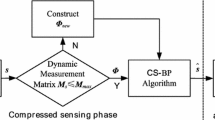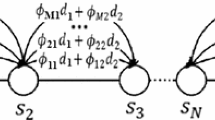Abstract
Sensor networks play crucial roles in the environmental monitoring. So far, the large amount of resource consumption in traditional sensor networks has been a huge challenge for environmental monitoring. Compressive sensing (CS) provides us a method to significantly decrease the number of sensors needed and Bayesian compressive sensing (BCS) makes it possible to deploy sensors selectively rather than randomly. By deploying sensors to the most informative places, we expect to reduce the reconstruction errors further compared with random sensor deployment. In this paper we employ multiple sensor deployment algorithms and BCS based signal recovery algorithm to build novel environmental monitoring systems, in which the environmental signals can be recovered accurately with undersampled measurements. Besides, we apply these environmental monitoring models to ozone data experiments to evaluate them and compare their performance. The results show a significant improvement in the recovery accuracy from random sensor deployment to selective sensor deployment. With 100 measurements for 16641 data points, the reconstruction error of one of the sensor deployment approaches was 40 % less than that of random sensor deployment, with 3.52 % and 6.08 % respectively.
Access this chapter
Tax calculation will be finalised at checkout
Purchases are for personal use only
Similar content being viewed by others
References
Candès, E.J., Romberg, J., Tao, T.: Stable signal recovery from incomplete and inaccurate measurements. Comm. Pure Appl. Math. 59, 1207–1223 (2006)
Donoho, D.L.: Compressed sensing. IEEE Trans. Inf. Theor. 52(4), 1289–1306 (2006)
Yan, S., Wu, C., Dai, W., Ghanem, M., Guo, Y.: Environmental monitoring via compressive sensing. In: Proceedings of the SensorKDD’12 Sixth International Workshop on Knowledge Discovery from Sensor Data, 12–16 August 2012, Beijing, China, pp. 61–68 (2012)
Nott, D.J., Dunsmuir, W.T.M.: Estimation of nonstationary spatial covariance structure. Biometrika 89, 819–829 (2002)
Candès, E.J., Braun, N., Wakin, M.B.: Sparse signal and image recovery from compressive samples. ISBI 2007, 976–979 (2007)
Baraniuk, R., Cevher, V., Duarte, M.F., Hegde, C.: Model-based compressive sensing. IEEE Trans. Inf. Theor. 56(4), 1982–2001 (2010)
Ingelrest, F., Barrenetxea, G., Schaefer, G., Vetterli, M., Couach, O., Parlange, M.: SensorScope: application-specific sensor network for environmental monitoring. TOSN 6(2) (2010)
Ramakrishnan, N., Bailey-Kellogg, C., Tadepalli, S., Pandey, V.N.: Gaussian processes for active data mining of spatial aggregates. In: SIAM Data Mining (2005)
Caselton, W.F., Zidek, J.V.: Optimal monitoring network designs. Stat. Probab. Lett. 2(4), 223–227 (1984)
Ji, S., Xue, Y., Carin, L.: Bayesian compressive sensing. IEEE Trans. Signal Process. 56(6), 2346–2356 (2008)
Krause, A., Singh, A.P., Guestrin, C.: Near-optimal sensor placements in gaussian processes: theory, efficient algorithms and empirical studies. J. Mach. Learn. Res. 9, 235–284 (2008)
Cover, T.M., Thomas, J.A.: Elements of Information Theory. Wiley, New York (1991)
Tipping, M.E.: Sparse Bayesian learning and the relevance vector machine. J. Mach. Learn. Res. 1, 211–244 (2001)
Tipping, M.E., Faul, A.C.: Fast marginal likelihood maximisation for sparse Bayesian models. In: Bishop, C.M., Frey, B.J. (eds.) Proceedings of the Ninth International Workshop on Artificial Intelligence and Statistics, Key West, FL, 3–6 January 2003
Davenport, M.A., Duarte, M.F., Eldar, Y.C., Kutyniok, G.: Introduction to Compressed Sensing. In: Eldar, Y., Kutyniok, G. (eds.) Compressed Sensing: Theory and Applications. Cambridge University Press, Cambridge (2011)
Acknowledgments
This work is partially supported by the Guangdong Innovation Group Project from Guangdong Government of China.
Author information
Authors and Affiliations
Corresponding author
Editor information
Editors and Affiliations
Rights and permissions
Copyright information
© 2014 Institute for Computer Sciences, Social Informatics and Telecommunications Engineering
About this paper
Cite this paper
Wu, C., Wu, D., Yan, S., Guo, Y. (2014). Sensor Deployment in Bayesian Compressive Sensing Based Environmental Monitoring. In: Stojmenovic, I., Cheng, Z., Guo, S. (eds) Mobile and Ubiquitous Systems: Computing, Networking, and Services. MobiQuitous 2013. Lecture Notes of the Institute for Computer Sciences, Social Informatics and Telecommunications Engineering, vol 131. Springer, Cham. https://doi.org/10.1007/978-3-319-11569-6_4
Download citation
DOI: https://doi.org/10.1007/978-3-319-11569-6_4
Published:
Publisher Name: Springer, Cham
Print ISBN: 978-3-319-11568-9
Online ISBN: 978-3-319-11569-6
eBook Packages: Computer ScienceComputer Science (R0)




